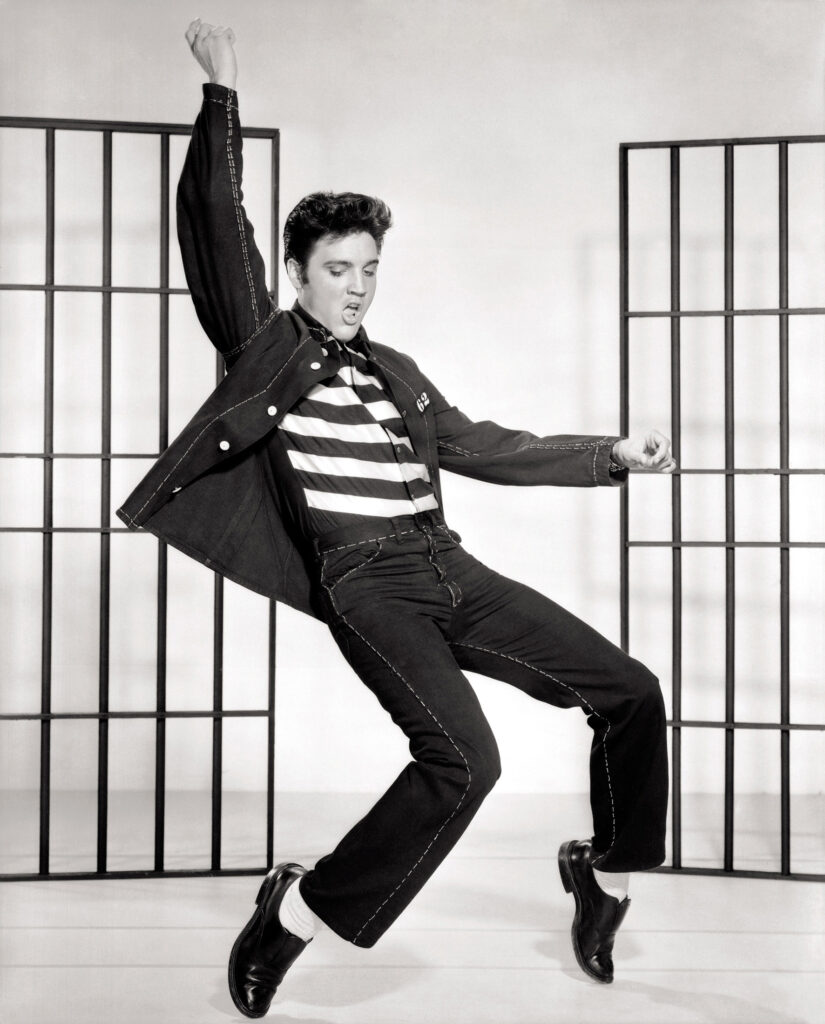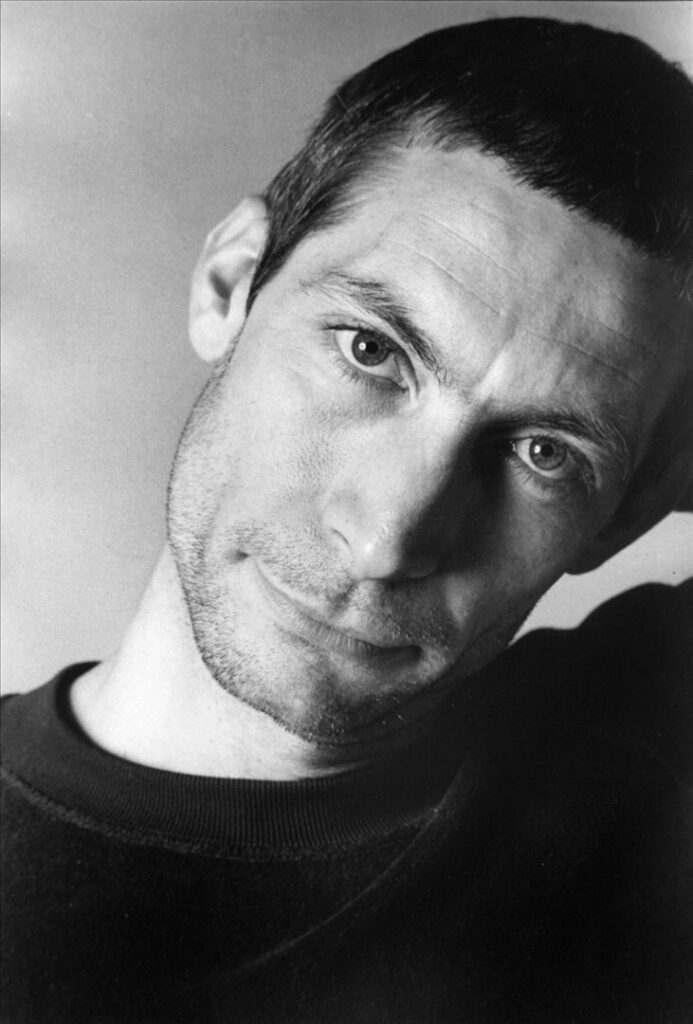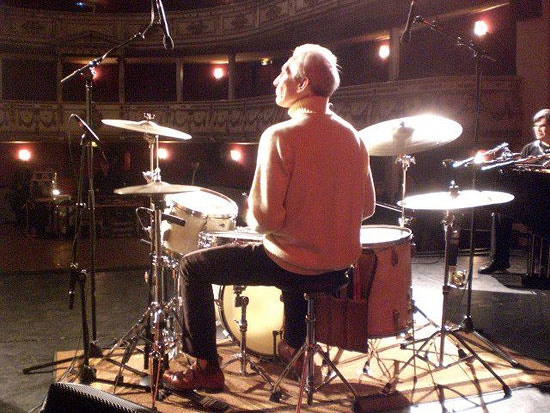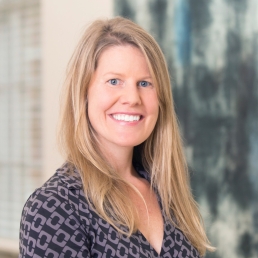This week Stan remembers the birth and death of two iconic musicians from the 20th century, and the recent deaths of five historians whose work over the past 60 years helped redefine several eras of American history.
Category Archives: People
The Gentleman Among the Pirates
How many Rolling Stones album covers featured Charlie Watts all by himself? Answer: one. When you’re in a band with a frontman with the world’s biggest ego—and you lack anything resembling an ego—you don’t often get the call. But Charles Robert Watts appears all by himself on the cover of the Stones’ 1970 live album, Get Yer Ya-Ya’s Out. It’s vintage Charlie.
And it is on this same album, recorded during their 1969 tour, that Mick banters playfully with the audience between songs, including, just before the opening riff on “Honky Tonk Women,” asking the crowd, “Charlie’s good tonight, ain’t he?” (Some insist that Mick actually combined the last two words in his inimitable British accent, as “innee.” Look it up and decide for yourself.) Yes, Charlie was good that night.
Charlie Watts was, from the beginning, my favorite Stone. Like me, he was a truck driver’s son; he was quiet, unassuming, thoughtful, and as I found out later, much more at home with a book than in front of a camera. Charlie Watts had no liking for stardom, rock glamour, or the limelight. “I don’t know what show biz is, and I’ve never watched MTV,” he once said. “There are people who just play instruments, and I’m pleased to be one of them.”
He simply wanted to be a drummer. He just happened to be the drummer for the world’s greatest rock n’roll band. Never mind that he was as responsible as Mick and Keith for that greatness. He always deflected credit elsewhere. Keith himself said, “Everybody thinks that Mick and Keith are The Rolling Stones. If Charlie wasn’t doing what he’s doing on drums, that wouldn’t be true at all. You’d find out that Charlie Watts is The Rolling Stones.”
If you doubt this, watch and listen to Charlie on the iconic blues opera “Midnight Rambler,” performed at Madison Square Garden on the band’s 40th anniversary tour in 2003. In my opinion, this is the best Rolling Stones live performance ever, period. Charlie drives that song forward from the opening note like the master that he was, and everyone else is playing catch-up, all while he appears to be doing nothing at all. Pay particular attention to the call-and-response with Mick in the middle.
Charlie Watts famously just wanted to play jazz. He was a struggling art student playing in Alexis Korner’s blues band when he met Brian Jones and a couple of other “white blokes from England,” as he put it, who invited him to join their band. They called themselves The Rolling Stones, after Muddy Waters’ song, “Rollin’ Stone Blues.” He joined, not expecting it to last long. On Tuesday, August 24, 2021, his membership in the band ended with his death, nearly 60 years later. Along the way they changed the course of musical history, redefining the sound of popular music in the 20th century.
Other people are better equipped to analyze and critique the musical career and influence of Charlie Watts. This is just an appreciation from a fan for whom Charlie Watts and the Stones have provided the soundtrack of my life for the last 40 years. I’ve written elsewhere about the first time I saw them, on October 26, 1981, at Atlanta’s Fox Theater. That magical, long-ago Monday night started something in me that has never ended, and Charlie Watts has been a huge part of it. I’ve seen the Stones live 10 times, from 1981 to 2019, and somehow they got better with every concert, defying age and time in a way that seemed surreal. They were indestructible and would surely go on forever.
Charlie joined the band in January 1963, and he never missed a concert over the next 56 years that they toured. He, Mick, and Keith played on every Stones album ever released.
He was there in the swingin’ 60s when shrieking fans flung themselves off balconies, climbed up on stage and pulled off the Stones’ clothes. He was there when the British invasion began, in rivalry with the Beatles. He was there when the band appeared on the Ed Sullivan Show in 1964. He was there with Mick and Keith when they fired Brian Jones from the band that he started. He was there at Hyde Park on July 5, 1969, to play a tribute concert to Jones just 2 days after his death. He was there at Altamonte Speedway on December 6, 1969, when the Hell’s Angels stabbed Meredith Hunter right in front of the band while they were performing. He was there through the 70s and all the great music they produced, from Let it Bleed to Sticky Fingers to Exile on Main Street to Some Girls. He was there when the band almost broke up in the mid-80s. He was there when they launched the first of the massively successful world tours with Steel Wheels in 1989 that continue to this day. He was there through all of the Mick and Keith feuds, all the drug use, marriages, divorces, arrests, and overdoses. When Brian Jones died, he was there, and when Bill Wyman left, he stayed on and chose the new bass player.
Charlie was there, playing on Paint it Black, Get off My Cloud, Under My Thumb, Satisfaction, Gimme Shelter, Jumpin’ Jack Flash, Brown Sugar, Wild Horses, Midnight Rambler, You Can’t Always Get What You Want, Sympathy for the Devil, It’s Only Rock n’Roll, Angie, Miss You, Beast of Burden, Emotional Rescue, She’s So Cold, Start Me Up, through Voodoo Lounge, Bridges to Babylon, A Bigger Bang, Blue and Lonesome, and all the other songs and albums and videos that have defined life for multiple generations of fans and inspired countless multitudes of musicians.
Through it all, Charlie played with finesse and style, a dapperly dressed gentleman on a pirate ship (as one critic put it), quietly holding the band together while “watching Mick’s bum wigglin’ about.” Charlie refused to be impressed by any of it, least of all by himself. Stardom changed not an ounce of his humility. He continued to sign letters “C.R. Watts (Drummer, The Rolling Stones),” as if people wouldn’t know him otherwise. But as the years went by, who invariably got the loudest ovation from fans at concerts? The Wembley Whammer.
It was glorious and historic and we thought it would never end. On Tuesday it did, just like that. The gentleman among the pirates took his leave, without warning, as some days simply disappear without flourish into night. Joan Armatrading spoke for all of us: “Why am I crying? Because Charlie Watts is dead. Who knew that any of The Rolling Stones musicians would ever leave this Earth?”
The question is, even now, has it ended?
If the Stones have been looking for a sign from the universe as to when to call it quits, in my opinion this is it. Yes, they could go on without Charlie. Mick and Keef are iconic Rock Gods, the best frontman and most famous rock outlaw in history. They are the legendary Glimmer Twins, two larger-than-life personalities who have dominated pop culture for 60 years, still strutting across the stage, as good as ever, and there will never be two like them again. It is a collaboration unlike any other in musical history.
But with the Stones, as with so many magical things in life, the whole was greater than the sum of its parts. If Mick, Keith, and Ronnie go on, as well they may, they’ll be a different band; they won’t be The Rolling Stones. Make no mistake, Charlie’s death marks the end of an era and of a band that began one year into JFK’s presidency and that continued without a break and without apology for nearly six decades. There is no precedent for what they’ve been, what they’ve accomplished, the people they influenced, the sheer joy they brought to millions around the world across all those years.
And there is nothing to replace them. Yes, I know there are other musicians and there are other bands, still producing good music.
But do me a favor—if you’re young, find a band you like that’s just started playing together in 2021. Check back in 2080–yes, 2080–and see if they’re still together and if they’re still playing sold-out stadiums. There is not and never will be another group like The Rolling Stones.
The drums are silent now. The seat at the small drum kit is empty. The heartbeat of the greatest rock n’roll band in the world has been stilled, and the void cannot be filled. Though the songs and the albums remain, the soul and spirit of the music has quietly passed on, leaving in its wake the awesome respect and outpouring of love that so many of us felt for this quiet, gentle, hugely talented man. What Charlie Watts and his band mates created will never be replicated, but what an enduring gift he and they have given us all.
The poet Wendell Berry wrote that “the end, too, is part of the pattern, the last labor of the heart; to learn to lie still, one with the earth again, and let the world go.”
Charlie’s good tonight, ain’t he?
Q&A: Reading and Writing with Holly Goldstein
Holly Goldstein is a Professor of Art History at the Savannah College of Art and Design in Savannah, where she has taught since 2010. She taught previously at the University of Hartford, Boston University, Suffolk University, and the Albuquerque Academy in New Mexico. She also served as a Curatorial Assistant in the Department of Photographs at the Fogg Museum, Harvard Art Museums. Dr. Goldstein earned a Ph.D. and M.A. in Art History from Boston University and an A.B. in Art from Princeton. She received the Dean’s Award for Teaching Effectiveness and the Ambassador’s Choice Award for Teaching Excellence at SCAD in 2014. Dr. Goldstein has collaborated with her students since 2014 on “Hidden Histories,” an ongoing online publication produced in partnership with the Georgia Historical Society. She is the co-author, with Christy Crisp, of “Savannah’s Hidden Histories: Using Art and Historical Markers to Explore Local History,” in The Art of Public History (Rowman & Littlefield, 2017).
What first got you interested in art history?
Art history is learning about the world through the objects humans have crafted. I’ve always been interested in the creative ways we communicate. My mom was the greatest early influence for my love of art and culture—she took me to museums, collected art, and could paint and draw in a way that made me want to do the same. Growing up, my family traveled constantly, and I was lucky to be introduced to museums and art objects as far back as I can remember. My childhood home was full of wacky and wonderful contemporary art, and our family travels inspired my love of deciphering visual storytelling. As a senior in high school, I took an AP Art History class, which set me on the path to pursuing art history professionally. Actually, my first job after college was teaching high school AP Art History, along with photography and fine art foundations.
What kind of reader were you as a child? Which childhood books and authors stick with you most?
I remember reading as much as I could, always trying to keep up with my older sister. I loved the Ramona books [by Beverly Cleary, 1955-1999], From the Mixed-Up Files of Mrs. Basil E. Frankweiler [by E.L. Konigsburg, 1967], A Wrinkle in Time [by Madeleine L’Engle, 1962], The Phantom Tollbooth [by Norton Juster, 1961], The Babysitter’s Club [by Ann M. Martin, 1986-2000], Encyclopedia Brown [by Donald J. Sobol, 1963], Nancy Drew, and I went through a memorable Agatha Christie phase. The Little House books inspired my fascination with the American landscape. For the past few years my daughters have begun discovering these same books and introducing me to new ones, so now I’m a big Harry Potter fan, too (and proud Hufflepuff).
What book did you read in grad school that you never want to see again—and what book was most influential?
The grad school books I never want to see again were not from my art history classes, I loved every one of those. But German for Reading Knowledge does not remain on my bookshelf—I passed my required language exams and that was the end of that book for me. I have to say, though, that I still appreciate and use my “reading knowledge” of German! The most influential book was perhaps Mary Warner Marien’s Photography: A Cultural History [Harry N. Abrams, 2002]. This rich contextual history opened my eyes to viewing photography as a key to understanding diverse multi-cultural value systems, and I use it as a textbook for my undergraduate students. Additionally, the insightful scholarship of photo-historian Martha Sandweiss provided a formative inspiration for me in graduate school; in particular, Print the Legend: Photography and the American West [Yale University Press, 2002] has influenced my own writing and teaching on landscape photography.
What’s the last great book you read, fiction or non-fiction?
This is the happy moment where I get to praise a brand-new work of brilliant fiction by my friend Katie Kitamura. Katie and I went to college together at Princeton, and I was dazzled then (as now) by her wit and humor. She is an extraordinary novelist, and I just finished her recent book Intimacies (published by Riverhead Books in July 2021). Katie uses spare descriptive language to conjure emotionally searing moments of incongruous wonder. Her previous novel, A Separation [Riverhead, 2018] is equally excellent. A few years ago, Katie visited Savannah as an honoree of our fabulous Book Festival, and I was lucky to escort her to Leopold’s where they served her a special ice cream concoction inspired by her book.
When you’re not reading for your particular field of history, what else do you like to read? What genres do you avoid? And what’s your guilty reading pleasure?
I like historical and contemporary fiction. This past summer I read a ton of books; I finally felt I had the time to read stacks of novels for pleasure. I found recommendations by joining an app called “Book of the Month” that sends me a hardcover book in the mail each month (it’s great—check it out!), visiting my favorite local Savannah bookseller E. Shaver, and using a Kindle while traveling. Recent favorites have included Kristen Hannah’s The Great Alone [St. Martin’s Press, 2018] and Charlotte McConaghy’s Once There Were Wolves [Flatiron Books, 2021]. And I adore anything by Ann Patchett—I just finished The Dutch House [Harper, 2019]. My guilty pleasure is online celebrity gossip. There, I said it. I grew up in LA; it’s in my blood.
What do you read—in print or online—to stay informed?
I read the New Yorker every week as my way to keep up with current cultural and political happenings, and I love the feel and familiarity of the paper magazine. Online, I read the New York Times daily. I like to assign articles from current newspapers to my students since I teach contemporary art, so I’m constantly reading a variety of newspapers and art journals online. I’m always looking for new publications about the coastal South to inform my “Hidden Histories of Savannah” class. My recent favorite is the anthology Coastal Nature, Coastal Culture: Environmental Histories of the Georgia Coast [edited by Paul Sutter and Paul Pressly, University of Georgia Press, 2018] for an insightful compendium of articles examining issues of race, ecology, and history.
Describe your ideal reading experience (when, where, what, how)
Celebrity gossip, on my iPhone, under my covers. And I tend to do a lot of reading while I’m waiting for my kids—in the carpool line, waiting at a tennis lesson—and I love the few stolen minutes of pleasure here and there with my latest hardcover or New Yorker throughout each day.
What’s your favorite book no one else has heard of?
Well, people have definitely heard of it, but it could certainly use as much vocal praise as possible: Lost and Wanted: A Novel by Nell Freudenberger [Knopf, 2019] is exceptional. And, I love maps. The book You are Here: Personal Geographies and Other Maps of the Imagination by Katharine Harmon [Princeton Architectural Press, 2003] inspired me to examine the links between maps and art, truth and fiction.
What book or collection of books might people be surprised to find on your shelves?
I have a lot of books, mostly in the academic genres of landscape photography, cultural geography, and local Savannah history. But I also have an interesting selection of cookbooks, which is surprising because I (almost) never follow directions when I cook. I cook constantly and love it, but I don’t seem to be able to follow recipe directions!
How have your reading tastes changed over time?
Growing up, I always loved reading the books that were assigned in English and literature classes. Everything from Island of the Blue Dolphins [by Scott O’Dell, 1960] to Jane Eyre to Beowulf made an impression on me. Once I stopped being a formal student, I realized I had missed out on many literary classics. So now, I’m trying to make a list and start reading some important and beloved books I (embarrassingly) have never actually read, including Moby Dick and some of the Jane Austen novels.
Disappointing, overrated, just not good: What book did you feel as if you were supposed to like, and didn’t? Do you remember the last book you put down without finishing?
In my quest to make up for lost time reading classics, I started The Brothers Karamazov—I didn’t get very far. It’s a really, really long book. Maybe I’ll return to it someday!
What book would you recommend for America’s current moment?
I recently read the novel The Vanishing Half by Brit Bennett [Riverhead Books, 2020]. It’s a meandering story of sisters that confronts issues of race and class, linking past and present, and I couldn’t put it down.
What do you plan to read next?
A classic! Moby Dick? It’s time.
What is the next book or article you’re going to write? When and how do you write?
These days, most of my writing occurs in collaboration with my undergraduate and graduate students. Each year I work with SCAD students to create entries for our “Hidden Histories” online exhibition which is hosted by the Georgia Historical Society website. The students research and write about Savannah’s lesser-known historical narratives, and I coach and collaborate with them in order to publish our work. Topics researched have included the history of Georgia-based soybean farming, the production by enslaved workers of Savannah gray brick, an examination of Savannah-based duels, an exploration of Revolutionary war hero Casimir Pulaski’s gender identity, and the ecological history of Ossabaw Island.
With which three historic figures, dead or alive, would you like to have dinner?
Georgia O’Keeffe, landscape painter, Meret Oppenheim, feminist Surrealist, and Mary Musgrove, Native American interpreter during the founding of the Georgia colony. If I get a fourth, Dr. Jill Biden is invited, too. And I would love to cook dinner with them, without following a recipe.
Podcast S4E9: Elvis, Napoleon, and the Bakersfield Sound
This week Stan revisits the death of the King, the birth of the phonograph, Buck Owens, the Aztec empire, Alfred Hitchcock, Napoleon, Margaret Mitchell, and one of the darkest episodes in Georgia history. He also remembers Rosalyn Carter’s birthday, a hero from Iwo Jima, and shares new additions to the Off the Deaton Path bookshelf.

Conrad Aiken: Cosmos Mariner
This week, Dispatches remembers Georgia author Conrad Aiken on his birthday, including his tragic early years. We also visit the final resting place of this first Georgian to win the Pulitzer Prize.







